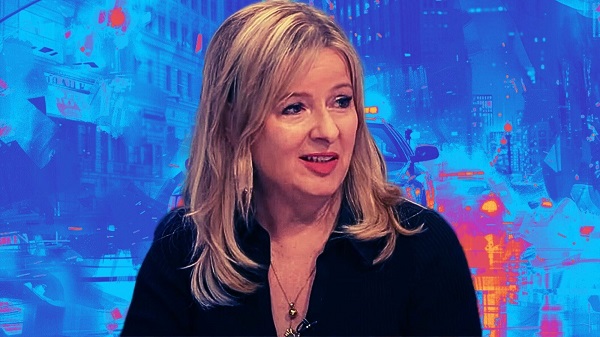Censorship Industrial Complex
Police Probe Journalist Over Year-Old Social Media Post

|
British Journalist Allison Pearson of The Telegraph has found herself under an unexpected police investigation following a social media post she made last year. According to Pearson, the inquiry began with a knock on her door at 9:40 am when two officers informed her that she was under scrutiny for allegedly inciting racial hatred in a post on X. Yet, they won’t tell her what the supposedly offending post was.
Pearson recounted the visit in an article, describing her surprise as the officers delivered the news. “I was accused of a non-crime hate incident. It had to do with something I had posted on X a year ago. A YEAR ago? Yes. Stirring up racial hatred apparently,” she recalled one officer telling her. Despite her attempts to understand the specifics, the officers refused to reveal the details of her alleged offense or identify the complainant, noting only that the individual in question was designated as “the victim.” Essex Police has since clarified that the investigation is based on a report from another police force and is being pursued under section 17 of the Public Order Act 1986, which addresses materials potentially inciting racial hatred. In a statement, a spokesperson confirmed that officers had attended Pearson’s residence “to invite a woman to attend a voluntary interview on the matter.” This approach, however, has drawn criticism from free speech advocates who argue that police intervention in non-crime incidents has a chilling effect on public discourse. Pearson’s experience follows recent shifts in policing policies, stemming from a Court of Appeal decision favoring former officer Harry Miller. Miller had argued that police tracking of gender-critical opinions as hate incidents without criminality stifled free expression. Current UK Home Secretary Yvette Cooper is exploring ways to reinforce police surveillance of non-criminal hate incidents. Meanwhile, X owner Elon Musk, who has previously condemned Prime Minister Keir Starmer’s attacks on free speech, has publicly criticized British law enforcement for investigating social media posts, raising further questions about the role of police in moderating online speech. This incident has sparked a wave of criticism from various corners, including Chris Philp, the Conservative shadow home secretary, who argues that the police should focus on actual crimes rather than policing thoughts and opinions. Echoing this sentiment, Liz Truss, former prime minister, and Sir Iain Duncan Smith, the former Tory leader, have also voiced their concerns, with Truss decrying the investigation as a direct attack on free speech. Nigel Farage, leader of Reform UK, pointed out the irony of the police’s timing, noting that such actions on Remembrance Sunday, a day dedicated to democratic values and free speech, were particularly egregious. |
|
With your support, we can amplify voices that are often suppressed and spread the word about the urgent issues of censorship and surveillance.
Consider making a modest donation — just $5, or whatever amount you can afford. Your contribution will empower us to reach more people, educate them about these pressing issues, and engage them in our collective cause. Thank you for considering a contribution. Each donation not only supports our operations but also strengthens our efforts to challenge injustices and advocate for those who cannot speak out.
Thank you.
|
Censorship Industrial Complex
Pro-freedom group warns Liberal bill could secretly cut off Canadians’ internet access

From LifeSiteNews
“The minister could order this dissident’s internet and phone services be cut off and require that decision remain secret”
Free speech advocates have warned that the Liberals’ cybersecurity bill would allow them to block any individual’s internet access by secret order.
During an October 30 Public Safety committee meeting in the House of Commons, Canadian Constitution Foundation (CCF) counsel Josh Dehaas called for Liberals to rewrite Bill C-8, which would allow the government to secretly cut off Canadians access to the internet to mediate “any threat” to the telecommunications system.
“It is dangerous to civil liberties to allow the minister the power to cut off individual Canadians without proper due process and keep that secret,” Dehaas testified.
“Consider for example a protestor who the minister believes ‘may’ engage in a distributed denial of service attack, which is a common form of civil disobedience employed by political activists,” he warned.
“The minister could order this dissident’s internet and phone services be cut off and require that decision remain secret,” Dehaas continued, adding that the legislation does not require the government to obtain a warrant.
In response, Liberal MP Marianne Dandurand claimed that the legislation is aimed to protect the government form cyberattacks, not to limit freedom of speech. However, Dehaas pointed out that the vague phrasing of the legislation allows Liberals to censor Canadians to counter “any threat” to the telecommunications system.
Bill C-8, which is now in its second reading in the House of Commons, was introduced in June by Minister of Public Safety Gary Anandasangaree and contains a provision in which the federal government could stop “any specified person” from accessing the internet.
The federal government under Prime Minister Mark Carney claims that the bill is a way to stop “unprecedented cyber-threats.”
The bill, as written, claims that the government would need the power to cut someone off from the internet, as it could be “necessary to do so to secure the Canadian telecommunications system against any threat, including that of interference, manipulation, disruption, or degradation.”
Many Canadians, including Conservative MPs and freedom groups, have condemned the legislation, along with several other new Liberal bills which aim to censor internet content as well as go after people’s ability to speak their minds.
“Experts and civil society have warned that the legislation would confer ministerial powers that could be used to deliberately or inadvertently compromise the security of encryption standards within telecommunications networks that people, governments, and businesses across Canada rely upon, every day,” the Canadian Civil Liberties Association wrote in a recent press release.
Similarly, Canada’s own intelligence commissioner has warned that the bill, if passed as is, could potentially be unconstitutional, as it would allow for warrantless seizure of a person’s sensitive information.
Censorship Industrial Complex
Senate Grills Meta and Google Over Biden Administration’s Role in COVID-Era Content Censorship

Lawmakers pressed Meta and Google to explain how far White House outreach went in shaping their censorship decisions.
|
A Senate hearing this week discussed government influence on online speech, as senior executives from Meta and Google faced questions about the Biden administration’s communications with their companies during the COVID-19 pandemic.
The session, titled “Part II of Shut Your App: How Uncle Sam Jawboned Big Tech Into Silencing Americans,” highlighted the growing concern in Washington over what lawmakers describe as government-driven pressure to suppress lawful expression.
Senator Ted Cruz (R-TX), who led the hearing, began by declaring that “the right to speak out is the foundation of a free society” and warning that “censorship around the world is growing.”
He accused the Biden administration of pushing technology companies to restrict Americans’ speech during the pandemic, and he faulted both the companies and Democrats for failing to resist that pressure.
“Today, we pick off where the story left off,” Cruz said, pointing to Meta and Google as examples of firms that “were pressured by the Biden administration to censor the American people.”
He pledged to introduce the Jawbone Act, which he said would “provide a robust right to redress when Americans are targeted by their own government.”
Markham Erickson, Google’s Vice President of Government Affairs and Public Policy, defended the company’s approach, emphasizing that its moderation decisions are guided by long-standing internal policies, not by government direction.
“While we are a company dedicated to the goal of making the world’s information universally accessible, that doesn’t mean that we don’t have certain rules,” Erickson said, citing restrictions on “terrorist content, child sexual abuse material, hate speech, and other harmful content.”
He acknowledged that officials in the Biden administration had contacted Google during the pandemic to urge the removal of certain COVID-19 content from YouTube.
But Erickson maintained that the company “develop[ed] and enforce[d] our policies independently” and “rejected suggestions that did not align with those policies.”
Erickson also alleged that Google has a record of resisting censorship demands from foreign governments, citing its refusal to remove politically sensitive videos in Russia despite threats of imprisonment against employees and fines “that exceed more than the world’s GDP.”
Neil Potts, Meta’s Vice President of Public Policy, took a more reflective stance.
He reiterated that Meta has a “foundational commitment to free expression” and acknowledged that the company had yielded to “repeated pressure” from the Biden White House to restrict COVID-related posts, including satire and humor.
“We believe that government pressure was wrong and wish we had been more outspoken about it,” Potts said. He added that Meta “should not compromise our content standards due to pressure from any administration in either direction.”
Potts pointed to policy changes the company has made since then, such as ending its third-party fact-checking program, reducing restrictions on political topics, and adopting what he described as “a more personalized approach to political content.”
These steps, he said, were intended to “return to our ideals about free expression” and “allow for more speech.”
Senator Cruz pressed both executives on whether their companies regretted complying with government demands.
Potts responded that Meta “do[es] regret our actions for not speaking out more forcefully.”
Erickson, however, declined to use similar language, saying Google regularly receives “outreach from a lot of actors” and evaluates flagged material independently.
The exchange grew more pointed as Cruz questioned Google’s removal of a YouTube video that compiled election-fraud claims made by both major parties. Erickson conceded, “Yes, that is news,” when Cruz asked whether statements by presidential candidates about election integrity should be considered newsworthy.
But Erickson defended YouTube’s policies during the 2020 election, saying that after states had certified results, the company acted against “claims of widespread fraud” due to potential “real-world harm.”
Cruz accused Google of ideological bias and suggested the company was “unwilling to express regret for anything at all.”
He contrasted that with Meta’s statement of remorse and concluded that Google’s position reflected “a level of contempt for free speech that does not reflect well.”
Where Erickson had insisted that Google “continued to develop and enforce our policies independently,” the company’s letter to Congress acknowledged that “Senior Biden Administration officials, including White House officials, conducted repeated and sustained outreach” urging the removal of COVID-19 content that did not violate platform rules.
This was somewhat of a departure from the defensive posture Google maintained before the Senate.
|
|
|
|
You read Reclaim The Net because you believe in something deeper than headlines; you believe in the enduring values of free speech, individual liberty, and the right to privacy.
Every issue we publish is part of a larger fight: preserving the principles that built this country and protecting them from erosion in the digital age.
With your help, we can do more than simply hold the line: we can push back. We can shine a light on censorship, expose growing surveillance overreach, and give a voice to those being silenced.
If you’ve found any value in our work, please consider becoming a supporter.
Your support helps us expand our reach, educate more people, and continue this work.
Please become a supporter today.
Thank you for your support.
|
-

 Crime2 days ago
Crime2 days agoPublic Execution of Anti-Cartel Mayor in Michoacán Prompts U.S. Offer to Intervene Against Cartels
-

 Environment2 days ago
Environment2 days agoThe era of Climate Change Alarmism is over
-

 Alberta1 day ago
Alberta1 day agoCanada’s heavy oil finds new fans as global demand rises
-

 Aristotle Foundation2 days ago
Aristotle Foundation2 days agoB.C. government laid groundwork for turning private property into Aboriginal land
-

 Justice2 days ago
Justice2 days agoA Justice System That Hates Punishment Can’t Protect the Innocent
-

 International2 days ago
International2 days agoNigeria better stop killing Christians — or America’s coming “guns-a-blazing”
-

 Alberta6 hours ago
Alberta6 hours agoAlberta government’s plan will improve access to MRIs and CT scans
-

 Automotive1 day ago
Automotive1 day agoCanada’s EV experiment has FAILED










